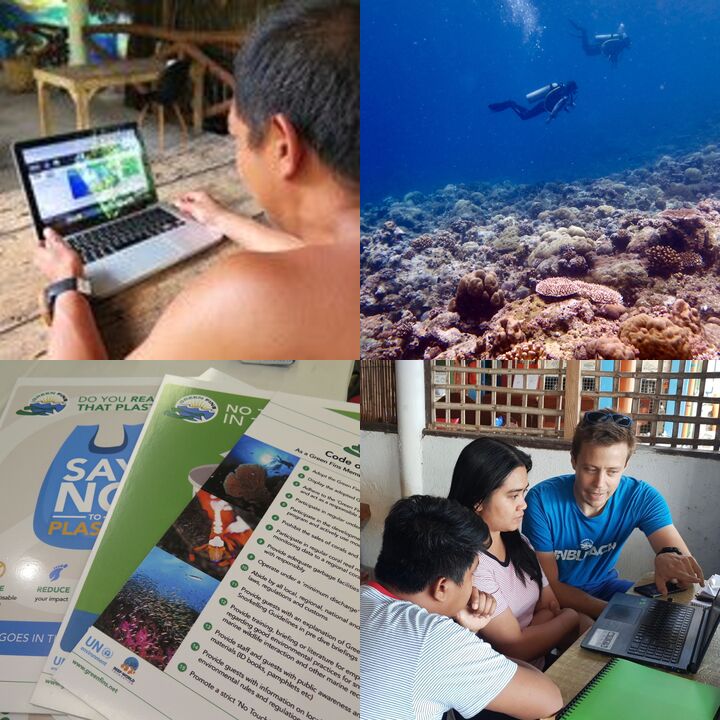Green Fins Global Hub
The Problem
Tropical marine ecosystems (coral reefs, seagrass & mangroves) are vital carbon sinks in addition to providing other critical ecosystem services to humanity. They’re under severe threat from climate change impacts (e.g. coral bleaching), which are projected to increase in intensity over time. On top of global threats, these ecosystems are subject to a myriad of local-scale threats. In tourism hotspots, unmanaged scuba diving causes intensive damage through poor environmental practices e.g. anchoring, direct diver damage, inadequate trash management & toxic chemical use throughout scuba diving operations, amongst others. Thus negatively impacting the primary business asset - the marine environment. With 1 million+ new divers certified/ year, & the growing accessibility and popularity of the sport, these threats need addressing urgently. Reef resilience is a growing marine ecosystems conservation approach focusing on alleviating local threats, allowing them to be healthier, more robust & resilient to climate change impacts. UNEP's Green Fins is a proven conservation approach that works in line with resilience based management by reducing coastal ecosystems threats posed by marine tourism. It is traditionally implemented by trained government teams conducting on site environmental assessments and training. Already active in 11 countries, demand for Green Fins globally greatly exceeds current capacity & a novel approach is required to achieve conservation impact scale.
Our Proposal
The Green Fins Global Hub will be a first-of-its-kind online support system to motivate scuba operators to improve their daily environmental practices at scale. The system will be paid-for by operator members (who have demonstrated a demand and willingness-to-pay through market research) to sustain its own operations. The Hub will harness our charity’s 10+ years grass-roots experience changing behaviour to adapt the proven Green Fins approach online, improving sustainability of the industry at scale & resulting in measurable reduction of local threats to coral reefs, giving them a better chance to survive mounting global threats. Annually, members will use the system to conduct environmental self-assessments, then are provided a choice of proven solutions to their highest identified threats, committing to options fit for their individual operation for the next year. Users have continued access to their action plans, with links to tools and knowledge required to address those threats & a community support feature to provide mutual support amongst members. The system will include achievement mechanisms and market-based incentives to welcome, feature, highlight & promote new and long term users. For example, online members will only be promoted on the public website and shared with third-party booking partners if they are improving in their assessments. This provides a strong incentive for continued system engagement & environmental behaviour change.
We Assume that...
Based on a growing scientific consensus, we assume that reducing direct local stresses to coral reefs leads to increased ecosystem resilience to the impacts of climate change.
The market research conducted has yielded an accurate representation of the positive reaction to, and willingness-to-pay of the industry for this product.
The solutions currently in effect and being taken up by the industry across 11 countries will be applicable globally, though there will be opportunity to update this as more users interact.
In the long-term, we assume that governments and industry decision makers will be able to use the data gathered to inform policy making to support sustainable marine tourism.
The majority of the audience will be able to interact with the system in English until we are able to provide translated copy at a later time.
Consumers trust the Green Fins brand and will choose member operators who are more sustainable.
This is an activity that will yield results and activate local / regional diving communities in spite of impacts associated with COVID-19.
Snorkel and free diving operations will be interested in the same type of guidance so in the future we will integrate tailored tools and resources to reach all types of marine tourism operators.
Constraints to Overcome
The Green Fins approach is proven effective in addressing barriers to the conservation problem, however the global reach of the programme has been constrained by capacity and lengthy timelines (see Project Origin). This has been exacerbated by dive centres distributed in inaccessible locations. Online access to the tools, resources, and incentives will address these constraints. A significant amount of initial capital is necessary to develop and market the application. It is typically difficult to find funding opportunities that cover the development and use of technology for conservation. We don’t yet know the full implications of the COVID-19 pandemic for the travel industry or how long it will take for visitor numbers to recover. Many business owners are using this time proactively to improve their internal environmental policies, and are seeing Green Fins as a resource to accomplish that.
Current Work
So far, we have completed: [1] Project plan; [2] Project SWOT analysis; [3] Market research; [4] Business plan; [5] High-level product requirement document (PRD) In progress: [1] Design specification document (DSD) including wireframes; [2] Request for proposal (RFP) process design [3] Ongoing consultation with the industry on the concept and final solution Pending funding: [1] Research solutions to populate the Hub; [2] Platform development including infrastructure and system testing; [3] User testing with ~50 dive operators; [4] Development of marketing campaign; [5] Launch; [6] Iterative refinement
Current Needs
We need support to raise the remaining funds necessary to confidently begin engaging with potential bespoke development agencies. We would also benefit from digital behavioural change expertise (to assist with translating our on-the-ground expertise to the digital space) to validate our existing product requirement document, and review and provide feedback on the lo-fi prototype we hope to develop as part of this challenge.

